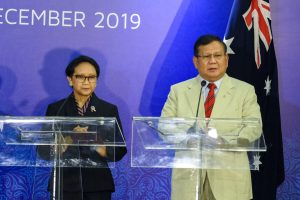Last week, Indonesia’s defense minister made a visit to the United States to meet President Donald Trump’s top defense officials. The trip hardly made news in Australia, and very few people know, or care, about Indonesia’s defense minister. But they should.
Prabowo Subianto met with U.S. Secretary of Defense Mark Esper to discuss regional security and defense issues, but the trip highlighted the diplomatic challenges for Australia given the former lieutenant-general’s history, and plans for his own future within Indonesia’s political system.
In 1998, Prabowo was dishonorably discharged from the Indonesian military following alleged atrocities in East Timor, and for allegedly kidnapping and torturing pro-democracy activists in the lead-up to the overthrow of then President Suharto. These alleged offenses were never proven in court within Indonesia but, based on strong evidence, did result in the U.S. government banning Prabowo from traveling to America. The Australian government implemented a similar ban until 2014, when, in anticipation that the former Suharto strongman might win the presidential election, officials quietly removed the travel restrictions.
Prabowo failed to win the presidential election in 2014, losing narrowly to the current incumbent, Joko “Jokowi” Widodo. At last year’s election, Prabowo once again failed to oust Jokowi, this time losing by a slightly greater margin but still maintaining widespread support among military personnel and many everyday kampung or village voters who yearn for a return to the “disciplined” days of Suharto.
Jokowi, only too aware of the popularity of Prabowo despite his dark past, and as only could happen in Indonesia, not only offered Prabowo a senior position within the new cabinet, but handed to him the critically important defense portfolio. It was a risky play by the president and one that most observers agreed would either prove a masterstroke by nullifying his main opponent, or blow-up in Jokowi’s face.
Prabowo is known for his often violent and temperamental moods, but despite the flaw in his personality, the former general is savvy, intelligent, strong, and a good strategic thinker. He also speaks fluent English and unlike his president, appears very comfortable in dealing with powerful people from Western countries.
With one eye on the 2024 election, to date Prabowo has actually proven to be a very effective defense minister, courting both Russia and also China, despite his deep reservations about what plans the Chinese leadership may have for the region. In many respects Indonesia and Australia share similar challenges with regard to China, with both countries being heavily dependent economically on the Asian superpower, while both having serious misgivings about Beijing’s intentions and behavior throughout the Indo-Pacific region.
Prabowo’s invitation to visit the United States – and the removal of his travel ban – had much to do with Washington’s position on China, and the need for an Indonesia that is supportive of a robust American role in the region. This week, Secretary of State Mike Pompeo will pay a visit to Indonesia, as part of a wider regional tour that will also involve stops in India, Sri Lanka, and the Maldives. While in Jakarta, he will “meet with his Indonesian counterparts to affirm the two countries’ vision of a free and open Indo-Pacific,” according to the U.S. State Department.
Despite Pompeo’s democratic rhetoric, the Trump administration’s concern about Chinese inroads has led it to take a pragmatic approach toward democracy and human rights in the Indo-Pacific region, a position that Prabowo understands and has sought to exploit. The same will probably be true of a Joe Biden administration should the former vice president prevail in the presidential election next week.
So where does this leave Australia, which, while no longer having an official ban on Prabowo’s entry to the country, has considerable suspicions as to how the former general would behave should he make a successfully run for the presidency in 2024? How would Canberra handle Prabowo should he achieve his ultimate goal of leading Indonesia?
Four years is still a long way off, but a Prabowo presidency would certainly make the bilateral relationship with Australia far more visible, given Jokowi’s well-known indifference to foreign affairs. It may also mean a more volatile and demanding relationship than Australia has faced under Jokowi, and under his predecessor, Susilo Bambang Yudhoyono.
For the time being, Prabowo Subianto remains a powerful figure within Indonesia and a prominent one within the region. As the biannual Australia-Indonesia Foreign and Defense Ministers’ 2+2 meeting approaches next year, the choice to follow the American lead in overlooking Prabowo’s dark and questionable past may prove unavoidable for Australian leaders. To do so would risk outrage from human rights activists, but the reality may be that the country’s leaders simply cannot afford to alienate a nationalistic and more autocratic Indonesia at a time when the region is facing increased instability and an uncertain future. After all, Australia has already “boxed itself in” to an ongoing strained and sometimes bitter relationship with China,
Ross B. Taylor AM is the president of the Perth-based Indonesia Institute Inc. He is the former national vice president of the Australia-Indonesia Business Council and a former Western Australian government commissioner to Indonesia, based in Jakarta.

































